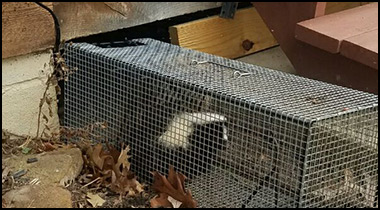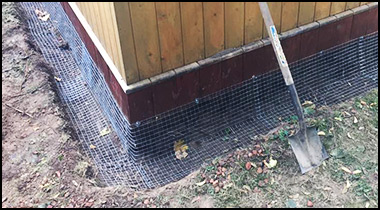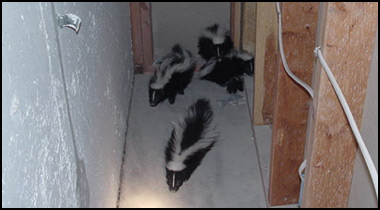Eugene Skunk Removal Resources
Skunk Rehabber - Oregon Wild: (541) 344-0675
Free Lane County Animal Services: (541) 682-3645
Humane Wildlife Trappers of Eugene: 541-255-2308
If you need skunk control in Eugene, you have a few options. First, you can attempt to solve the skunk problem yourself by reading our do-it-yourself guide. If you need outside help, you can also call Lane County Animal Services to see if they have any free resources or help for you - however, they primarily deal with dog and cat concerns. You can also call a local Eugene wildlife rehabber, as they are typically a great resource for advice that is in the best welfare of the animal. If as a last resort you must hire a professional company, we recommend Humane Wildlife Trappers of Eugene at 541-255-2308. To learn more about them or check their skunk removal prices, visit eugenepestanimal.com.

Eugene Skunk Trapping and Removal

Preventative Repairs & Exclusion

Eugene Skunk Removal From Structures
In many cases, preventative measures can solve your Eugene skunk problem - keep garbage secured, pet food indoors, and most of all when it comes to skunks, secure the perimeter of your shed, porch, deck, or house with a barrier - lattice or steel mesh is good, and it keeps Oregon skunks from going under the structure. If trapping and removal of the skunk is the only option you have, please do so with the help of a local agency or professional company who knows how to do it humanely and legally. Browse the resources of this site for more educational information.
Frequently Asked Questions:
Prevention: How to Keep Skunks Away
What to do with a skunk after I catch it?
Is it legal for me to trap a skunk?
How to remove skunk odor
Is a skunk active during the daytime rabid?
What does skunk feces look like?
Eugene Skunk Control Information: What are some of the symptoms of a sick skunk?
Just like most animals, Skunks can become sick. Sometimes these illnesses can be contagious to man or other animals. In some situations these illnesses can be passed only between skunks, or worse, transmitted to people or other animals. Remember skunks are a natural pest, treat them with respect and do not get too close, even if you are trying to help, especially if the animal looks sick. It is easy to catch harmful diseases from animals, but if skunks become a problem for you, taking the right precautions allows you to deal with them safely and not put yourself, your family, or your pets in danger.
Here are some types of illnesses and indicators that a skunk could be infected. Most diseases contracted by skunks can be transmitted to other animals, Often when a skunk chooses to attack a person or animal, they are found to be transmitters of rabies. This does not mean all skunks you will see will carry rabies, but if you get bitten please be tested right away!
Some diseases are more serious than others. One such condition is Aleutian disease, caused by a virus that affects a number of different systems in the body. This disease ultimately leads to organ failure in the animal. Skunks would rather run away if confronted, but if they feel must fight, then their bites and scratches can transmit diseases there is also the possibility of zoometric diseases, that is those passed on through urine skunk feces.
Because there are dangerous conditions that can be transmitted through skunk feces, such as leptospirosis, always take precautions before entering any confined area where skunks have been, or disturbing a skunk's den. . Leptospirosis is a condition whose symptoms are severe headaches, muscle pains, and fever, severe cases can lead to kidney failure, liver damage and meningitis. Tularemia appears around three or five days after a bite, scratch or contact with skunk feces and urine. It causes symptoms such as fever, loss of appetite and sepsis.
These animals create a huge amount of droppings, and many diseases can become airborne as the feces dries. You should wear a pair of goggles and breathing apparatus, when clearing a skunk area. It is also important to properly dispose of all droppings and refuse.
Ensure that the feces is bagged, and placed in a sealed container or garbage can., a serious problem that you need to be aware of when dealing with skunks is the ability to transmit canine distemper to your pets and other domestic animals. Symptoms include vomiting, diarrhea, fever and inflammation of the eyes. It is usually transmitted when animals by direct contact with the feces or urine of an infected skunk. Skunks carry Parasites too, and roundworm and ringworm can both be transmitted to domestic animals. Take precautions with your pets. Vaccinate your dogs against canine distemper that can be passed on by skunks
Remember, for free services you can try (541) 344-0675 or (541) 682-3645, but if you need to pay for professional help, check the prices at the eugenepestanimal.com website. Or follow our do-it-yourself guide!

